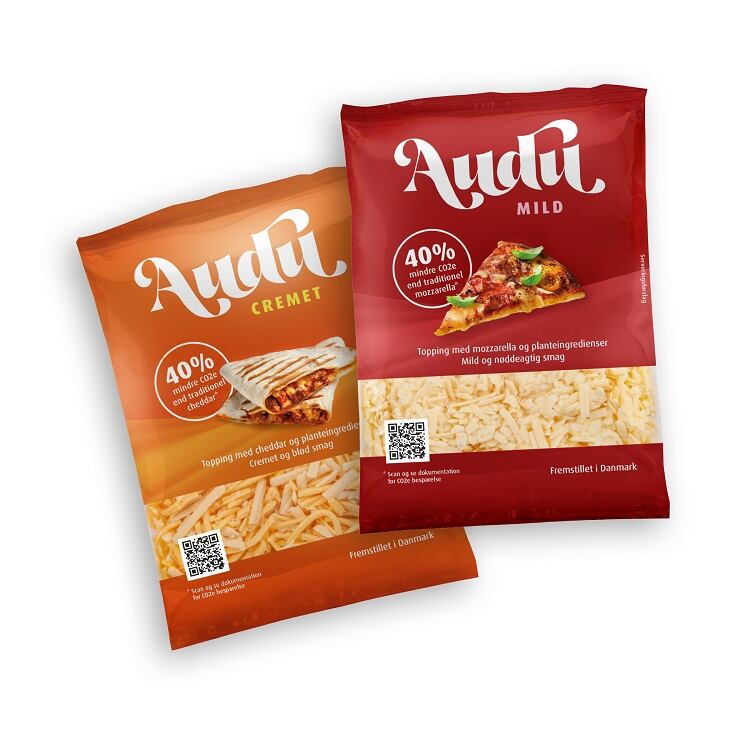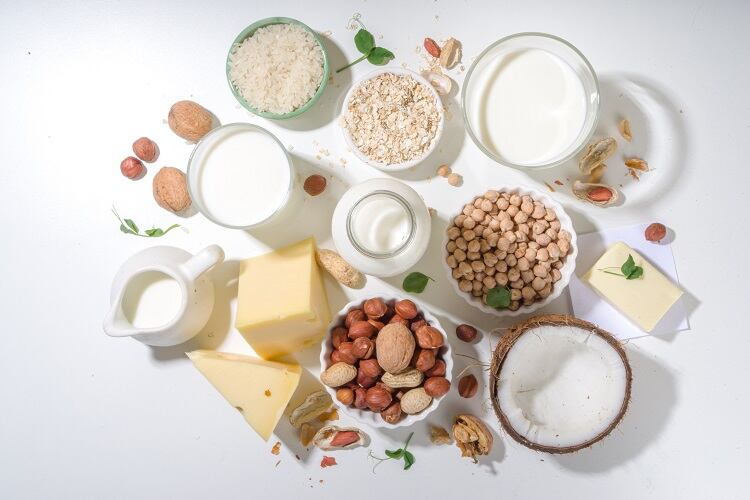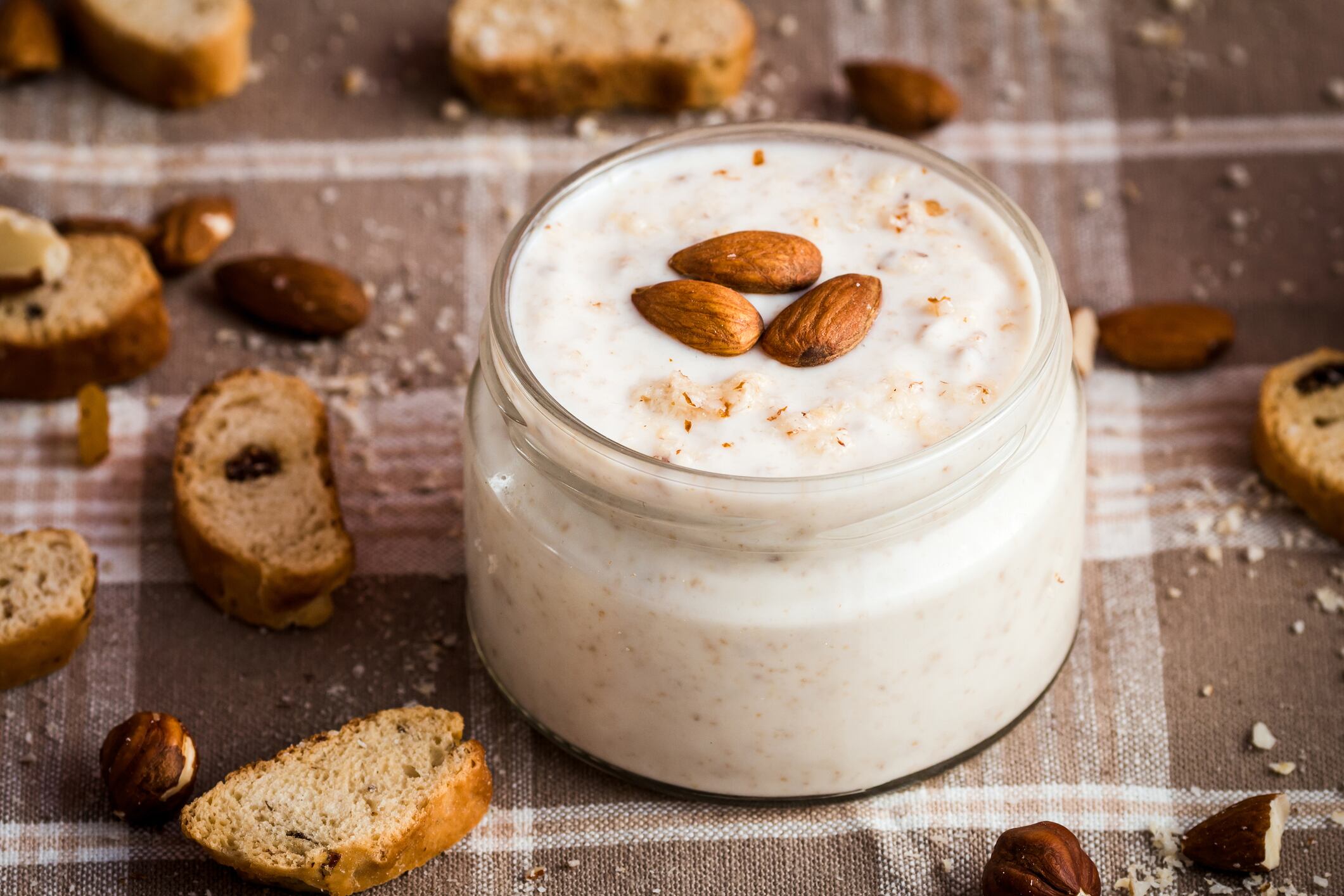Hybrid dairy, combining dairy and plant-based ingredients, is a nascent category. Although thought by some to hold consumer appeal, innovation is lacking. In fact, you’d be hard pressed to find a hybrid milk, yoghurt or ice cream product on-shelf.
That is except in Denmark, where a new hybrid dairy company, PlanetDairy, has launched hybrid cheese brand Audu. Although technically a hybrid (in that the cheese is made up of a blend of dairy and plant-based ingredients), you will not find the term ‘hybrid’ on pack.
Nor will you find any other descriptors such as ‘more sustainable’ or ‘green’ cheese. And this is all intentional. “We’re trying to find the sweet spot where we can speak to traditional consumers [rather than] vegans and vegetarians,” chair and commercial lead Jesper Colding explained.
Why PlanetDairy chose to make hybrid, not plant-based, cheese
PlanetDairy aims to make new dairy products with lower CO2e footprints. Founded by a team of ex-dairy executives, the company’s end goal is to make it ‘very easy’ for retailers and consumers to make the switch from conventional dairy products to more sustainable alternatives.
According to the UN, the dairy industry is responsible for roughly 3.4% of global greenhouse gas (GHG) emissions.
What does 'Audu' mean?
The brand name Audu is inspired by a ‘milk-rich cow’ in Norse mythology known as Auðumbla. The cow gave milk to the gods, which indirectly links it to creation, the divine, and the formation of the cosmos.
While a good number of brands are currently selling dairy alternatives with a similar aim – to reduce carbon footprints – most are doing so through a purely plant-based lens. But uptake has not been as strong as industry expected, according to Colding. “It’s going to take a long time before consumers are willing to jump into that space. The plant-based category was really hyped three to four years ago, but mainstream consumers feel they’re sacrificing [taste and texture] when they go there.”

Instead, PlanetDairy’s solution is to combine dairy and plant-based ingredients with the latter making up at least 50% of the formulation. Under the Audu brand, four SKUs are currently on the market: a grated mozzarella alternative; a grated cheddar alternative, a block cheese alternative and slices. “We’ve started with cheese because that’s where consumers have experienced the biggest performance gap.”
On the plant-based side of things, PlanetDairy is sourcing pea and faba proteins from France, and coconut oil from the Philippines and Indonesia. Other oils come from rapeseed and shea. Dairy ingredients are coming from Europe: with dairy proteins and fats sourced locally in Denmark and its cheddar base coming from the UK.
Addressing functionality and protein gaps in plant-based cheese
PlanetDairy has two approaches to developing its hybrid products. Its cheddar alternative starts with a cheddar base, to which it adds plant-based ingredients. For the mozzarella alternative, dairy protein and fats are blended with plant-based ingredients from the get-go. The plant ingredients are chosen with the aim of maximising protein availability and digestibility, we were told.
But combining dairy with plant-based proteins is not as simple as it seems. The plant base comes with a different pH to dairy and can contribute a ‘beany’ taste and ‘gritty’ mouthfeel to the final product, Colding explained. Add this to the fact that plant spores love to feed on dairy nutrients, and shelf-life can be compromised. “It’s not easy to do, but along the way we have discovered [a technology] that we think is proprietary to us. We have IP in the pipeline.”
In blending dairy with plant-based ingredients, PlanetDairy claims to have addressed the functionality gap that can exist in purely plant-based cheese. Without the addition of dairy, it can be challenging to achieve ‘stretchiness’ and ‘meltability’. But the commercial lead told us a consumer using PlanetDairy’s shredded hybrid cheese wouldn’t notice it had any plant-based ingredients in its formulation at all.
“On a scientific level, casein is a fantastic protein. If you take out the casein in cheese, there is a price to pay. The question is if that price to pay is so high that consumers notice the difference. We’ve been able to formulate products that are really good through work with Copenhagen University, [ingredients supplier] Chr Hansen, and others.
“Our aim is not to produce better products than dairy. Our aim is to find the sweet spot between taste and lower CO2: if the product doesn’t taste good, we can forget it.”
In using dairy and plant proteins, PlanetDairy claims to also be closing the protein gap that exists in many purely plant-based products. In recent years, approaches to plant-based cheese have relied on starches, fats and aromas with minimal, if any, protein. PlanetDairy’s cheese contain at least 14% protein, which is considerably higher than plant-based cheese alternatives, but lower than the standard 25% in conventional cheddar.
Why PlanetDairy is not marketing itself as ‘hybrid’ (even though it technically is)
Audu products communicate that they’re made with cheese and plants front-of-pack, which is accompanied by a claim that its products are responsible for 40% fewer CO2e than their conventional counterparts.

But they don’t carry pictures of plants and their packaging largely mimics that of conventional cheese products. The term ‘hybrid’ is nowhere to be seen. For a consumer in the supermarket, the product comes across as more ‘cheese’ than ‘plants’.
That is not to say that PlanetDairy is hiding its plant-based content. “We’re transparent in what we’re offering,” confirmed Colding. But the company does not want to create a ‘barrier’ between its products and potential customers.
“When there is not a ‘climate itch’ for the ordinary customer, they are not willing to sacrifice on [taste and functionality]. We’ve seen that you must create a greater ‘comfort zone’ for the consumer. So we’ve created an impression of comfort, and then when that’s been established, we talk about our proposition.
“We don’t say we’re a green cheese, we don’t say we’re a more sustainable cheese, we just present the facts: we use plant-based ingredients and provide a life cycle assessment benchmark verified by Carbon Cloud.”
The decision to avoid the term ‘hybrid’– which is typically the descriptor used for these types of products – comes from industry learnings. The company founders studied the hybrid category prior to launching and noticed that some products obviously marketed as ‘hybrid’ were no longer on shelves. Examples include Live Real Farms’ products in the US and Triballat Noyal’s Pâquerette & Compagnie brand in France. Both sold hybrid milk products.
“Most hybrids that we studied haven’t worked. Our immediate conclusion is that you fall between two stools: you’re not a dairy product, you’re not a plant product. So who are you really talking to here? We call it the ‘hybrid trap’.
What’s around the corner for PlanetDairy?
PlanetDairy’s Audu brand first launched in 2023 and has since observed ‘wide acceptance’ amongst Danish retailers. The company is ‘satisfied’ with sales to date, which Colding described as ‘encouraging’: “We can see that our market share is better than the plant-based equivalent.”
In terms of pricing, its products are priced close to the market leader in conventional cheese.
As to PlanetDairy’s next steps, other hybrid dairy products are in the pipeline, ranging from milk to yoghurt and cream cheese. For the time being, new product development will continue to centre around plant and dairy-based ingredients, but down the line the company wants to incorporate precision fermentation-derived ingredients too.
What is precision fermentation?
Precision fermentation is a microorganism-based process, whereby microbes are used as production factories to produce complex proteins, such as dairy.
Once these novel proteins receive regulatory approval and can compete on cost, PlanetDairy sees opportunity for a ‘whole new’ type of dairy company. “That’s the company we want to create.”
At the same time, the company does not believe conventional dairy will ever be completely displaced. Nor does Colding want it to be. “I love cheese and I’m not going to stop eating cow cheese. But the point is, you don’t have to eat pure dairy products all the time.
“We envision that there will always be a dairy industry, it is part of our culture. But at the same time, there will be companies like us who fill some space and supplement the category. We can grow the category together.”



